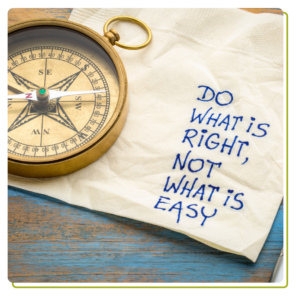 When you seek support in therapy, you’re also opening yourself up and entrusting someone with your most personal thoughts and emotions. Therapy should be a safe, confidential, and professional space where you can heal and grow — that’s why ethics in therapy are so critical. Ethical therapists uphold high standards to protect client well-being, maintain trust, and ensure the best possible care.
When you seek support in therapy, you’re also opening yourself up and entrusting someone with your most personal thoughts and emotions. Therapy should be a safe, confidential, and professional space where you can heal and grow — that’s why ethics in therapy are so critical. Ethical therapists uphold high standards to protect client well-being, maintain trust, and ensure the best possible care.
But how can you be sure a therapist follows these principles? Not all therapists adhere to the same ethical guidelines, and without proper vetting, finding a truly qualified professional can feel like a wild goose chase. That’s where GoodTherapy comes in. Every therapist in our directory meets strict ethical and professional standards, so you can confidently connect with a therapist who prioritizes your well-being.
Why Ethical Standards in Therapy Matter
Ethics are the foundation of quality mental health care. Without strong ethical guidelines, clients could face breaches of trust, poor treatment, or harmful mental outcomes. Ethical therapists follow professional codes of conduct that prioritize:
- Confidentiality: Your personal information should remain private. Ethical therapists only break confidentiality in rare situations required by law (such as when there’s a risk of harm).
- Informed Consent: Before starting therapy, clients should understand the treatment process, potential risks, and benefits so they can make informed decisions.
- Professional Boundaries: Therapists must maintain clear, appropriate relationships with clients, avoiding conflicts of interest or personal involvement.
- Competence and Ongoing Education: Ethical therapists continuously update their knowledge and skills to ensure they provide effective, evidence-based care.
- Client Well-Being First: An ethical therapist prioritizes what’s best for you — not their own personal beliefs, financial gain, or external influences.
Without these ethical safeguards, therapy can lose its effectiveness or worsen the mental health of the client. That’s why it’s so important to choose a therapist who follows these principles.
How GoodTherapy Helps You Find an Ethical, Qualified Therapist
While many therapists uphold ethical standards, it’s not always easy to verify their credentials, training, or commitment to ethical care. That’s why GoodTherapy is committed to taking the guesswork out of finding a professional you can trust.
Every therapist in our directory is thoroughly vetted to ensure they:
- Are fully licensed and in good standing with their professional boards.
- Commit to ethical, client-centered care in line with recognized industry standards.
- Engage in ongoing education to stay informed on best practices and emerging treatments.
- Uphold strict confidentiality and professional boundaries.
With so many therapy directories available today, it’s imperative to choose a platform that prioritizes ethical standards. At GoodTherapy, we make it easy for you to find a therapist who is not only experienced but also committed to ethical care of the highest quality.
Therapist Ethics Matter — So Does Where You Search
The right therapist can have a profound impact on your mental health journey. By choosing a therapist who upholds ethical guidelines, you’re ensuring a safe, professional, and effective therapeutic experience.
Don’t leave your mental health to chance. Start your search with GoodTherapy today and find a therapist you can trust.
The preceding article was solely written by the author named above. Any views and opinions expressed are not necessarily shared by GoodTherapy.org. Questions or concerns about the preceding article can be directed to the author or posted as a comment below.
